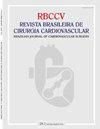希腊第一波COVID-19大流行期间心脏手术患者概况的趋势
IF 1.2
4区 医学
Q4 CARDIAC & CARDIOVASCULAR SYSTEMS
Revista Brasileira De Cirurgia Cardiovascular
Pub Date : 2022-05-23
DOI:10.21470/1678-9741-2021-0015
引用次数: 1
摘要
由于新冠肺炎大流行,人类面临着有史以来最大的医疗保健挑战之一。根据世界卫生组织2021年2月16日发布的每周行动报告,全球确诊病例110384747例,死亡2446008例(https://www.who.int/emergencies/diseases/novelcoronavirus-2019/situation-reports)。严重急性呼吸系统综合征冠状病毒2型具有高度传染性,很快就跨越了中国的边境,并很快成为一种全球健康威胁,其影响程度不可预测[1]。值得注意的是,新增感染率仍然很高,每周新增病例超过270万例,人们对与严重急性呼吸系统综合征冠状病毒2型变种相关的公共卫生事件非常担忧。关于心脏手术单元,对日常生活有明显的不同影响[2-5]。在入院程序、手术室和手术恢复期间积极的感染缓解策略、重症监护指南和限制方面发生了许多变化。此外,有必要推迟选择性心脏手术,以不同的方式管理医护人员的资源,应对患者和卫生专业人员感染风险的增加,以及患者过度怀疑,影响他们接受心脏手术的意愿。在第一波疫情期间的一项国际调查中,来自美国、欧洲、亚洲和澳大利亚的600多名心脏外科医生参与了这项调查,心脏手术病例数量的中位数减少了50%至75%,因为大多数中心推迟了择期病例,超过三分之一的中心报告重症监护能力减少了50%以上[6]。这导致了有关心脏手术优先事项的政策和指南的修改,以应对疫情要求和稀缺资源。然而,应根据具体情况考虑这些建议,并明确需要定期更新[7-9]。奥纳西斯心脏外科中心(OCSC)是一家专注于心脏外科和心脏病学患者治疗的三级医院。希腊第一波新冠肺炎大流行期间心脏手术患者概况第一波趋势的核心时期本文章由计算机程序翻译,如有差异,请以英文原文为准。
Trends regarding the profile of cardiac surgery patients during the first wave of COVID-19 pandemic in Greece
Humanity faces one of the greatest healthcare challenges ever, due to the COVID-19 pandemic. According to WHO’s weekly operational report, published on 16th February 2021, we have 110,384,747 confirmed cases and 2,446,008 deaths globally (https://www.who.int/emergencies/diseases/novelcoronavirus-2019/situation-reports). SARS-CoV-2 has been highly infectious, and it did not take long to cross the borders of China and soon become a global health threat with implications of unpredictable magnitude[1]. Noticeably, the rate of new infections is still high, with more than 2.7 million new cases per week, and there is a great concern regarding public health events associated with SARS-CoV-2 variants. Concerning cardiac surgery units, there was a clear impact on the daily routine in different ways[2-5]. Many changes took place regarding admission procedures, aggressive infection mitigation strategies in the operating room and during surgical recovery, intensive care guidelines and restrictions. Also, a necessity rose to postpone elective cardiac surgeries, to manage healthcare workers’ resources differently, to deal with the increased risk of infection for both patients and health professionals, along with the exaggerated skepticism among patients, affecting their willingness to undergo a cardiac surgery. In an international survey during the first wave of the pandemic, with the participation of more than 600 cardiac surgeons from America, Europe, Asia, and Australia, a median reduction in the volume of cardiac surgery cases was 50% to 75%, as most centers postponed elective cases and more than one-third of the centers reported more than 50% reductions in intensive care capacity[6]. This led to modifications in policies and guidelines regarding cardiac surgery priority to confront the pandemic requirements and scarce resources. However, these recommendations should be considered on case-by-case basis with a clear need for regular updates[7-9]. The Onassis Cardiac Surgery Center (OCSC) is a tertiary hospital focused on the treatment of cardiac surgery and cardiology patients. The core period of the first wave of the Trends regarding the profile of cardiac surgery patients during the first wave of COVID-19 pandemic in Greece
求助全文
通过发布文献求助,成功后即可免费获取论文全文。
去求助
来源期刊

Revista Brasileira De Cirurgia Cardiovascular
CARDIAC & CARDIOVASCULAR SYSTEMS-SURGERY
CiteScore
2.10
自引率
0.00%
发文量
176
审稿时长
20 weeks
期刊介绍:
Brazilian Journal of Cardiovascular Surgery (BJCVS) is the official journal of the Brazilian Society of Cardiovascular Surgery (SBCCV). BJCVS is a bimonthly, peer-reviewed scientific journal, with regular circulation since 1986.
BJCVS aims to record the scientific and innovation production in cardiovascular surgery and promote study, improvement and professional updating in the specialty. It has significant impact on cardiovascular surgery practice and related areas.
 求助内容:
求助内容: 应助结果提醒方式:
应助结果提醒方式:


